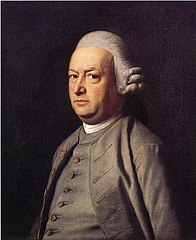“Their Orders were to keep the Door fast”
On Friday, 17 June 1774, inside the Salem courthouse, the Massachusetts assembly discussed sending five men to what would become the First Continental Congress.
According to the official tally, there were 129 members present. That was only about half the number of representatives that towns had elected in May, but the royal governor’s order to move the legislator to Salem had probably cut attendance. (And truth be told, the Massachusetts House rarely saw full attendance anyway.)
Of those 129 representatives, only twelve voted against the proposal. While some of the rest may have abstained, that number suggests that the Loyalist party commanded only a tenth of the chamber. Though there were lots of political arguments in Massachusetts during these tears, there were few close votes.
Nonetheless, Gov. Thomas Gage had a power stronger than democracy. Under the charter of 1692, he could simply declare the legislative session over, halting all bills.
As soon as he learned what was happening in the House, Gage sent the provincial secretary, Thomas Flucker (shown above), to Salem with just such an order.
The 20 June Boston Gazette reported:
The Massachusetts General Court was officially dissolved. Yet the assembly had officially passed the resolutions sending delegates to the congress and seeking money to pay for that trip. That packet of resolutions was quickly sent to the newspapers, which printed it before Gov. Gage’s proclamation.
TOMORROW: Meanwhile, in Faneuil Hall…
According to the official tally, there were 129 members present. That was only about half the number of representatives that towns had elected in May, but the royal governor’s order to move the legislator to Salem had probably cut attendance. (And truth be told, the Massachusetts House rarely saw full attendance anyway.)
Of those 129 representatives, only twelve voted against the proposal. While some of the rest may have abstained, that number suggests that the Loyalist party commanded only a tenth of the chamber. Though there were lots of political arguments in Massachusetts during these tears, there were few close votes.
Nonetheless, Gov. Thomas Gage had a power stronger than democracy. Under the charter of 1692, he could simply declare the legislative session over, halting all bills.
As soon as he learned what was happening in the House, Gage sent the provincial secretary, Thomas Flucker (shown above), to Salem with just such an order.
The 20 June Boston Gazette reported:
His Excellency the Governor having directed the Secretary to acquaint the two Houses it was his Excellency’s pleasure the General Assembly should be dissolved and to declare the same dissolved accordingly; the Secretary went to the Court House and finding the Door of the Representatives Chamber locked, directed the Messenger to go in, and acquaint the Speaker [Thomas Cushing] that the Secretary had a message from his Excellency to the Hon. House, and desired he might be admitted to deliver it;According to John Sanderson’s profile of Samuel Adams, published about half a century later:
The Messenger soon returned, and said he had acquainted the Speaker therewith, who mentioned it to the House, and their Orders were to keep the Door fast:
The door keeper seemed uneasy at his charge, and wavering with regard to the performance of the duty assigned to him. At this critical juncture, Mr. Adams relieved him, by taking the key and keeping it himself.Flucker proceeded with his royal duty, as the newspaper reported:
Whereupon, the following proclamation was published on the stairs leading to the Representatives Chamber, in presence of a Number of Members of the House, and immediately after in Council.To be clear, the Rev. William Gordon wrote that the secretary “read the proclamation upon the steps leading to the representatives’ chamber.” It’s unclear whether this was before or after the assembly’s vote, but the legislators didn’t acknowledge the governor’s proclamation until Adams opened the doors.
The Massachusetts General Court was officially dissolved. Yet the assembly had officially passed the resolutions sending delegates to the congress and seeking money to pay for that trip. That packet of resolutions was quickly sent to the newspapers, which printed it before Gov. Gage’s proclamation.
TOMORROW: Meanwhile, in Faneuil Hall…


No comments:
Post a Comment